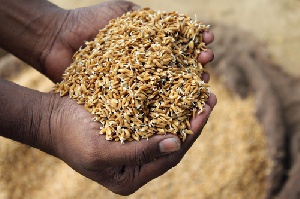Rice has become one of the most staple crops in Ghana. The local production is not able to meet the increasing demands. As a result, the country imports annually 600,000 metric tonnes of milled rice on average.
This is notwithstanding the fact that a number of farmers engage in rice production especially in the northern part of the country.
It has been identified that most of the rice farmers fail to adopt good farming practices in terms of proper land preparation techniques and the use of quality seeds for improved yields.
Failure to plant high quality rice seeds does not only result in poor yields but also affects the quality of rice produced thus resulting in red-rice, rice with different shapes, which is difficult to mill and cook well amongst others.
Many of the rice farmers have been sensitized on the need to undertake good land preparation techniques and plant quality seeds of improved varieties such as AGRA Rice and Jasmine, which guarantee high yields. However, majority of them are yet to embrace these modern techniques of rice farming.
This is why some of the development partners in the rice sector in the country including AfricaRice, have singled out Abanga Farms for praise for adhering to good farming practices as well as planting quality seeds to ensure high yields.
Abanga Farms, located in the Northern Region, has cultivated a 1,200-acre rice farm at Guo in the North Gonja District as part of efforts to increase domestic rice production as well as ensure food security in the country.
AGRA Rice, which is being promoted by AfricaRice under the Rice Seed Scaling project, is the variety planted on the field, and it is already at booting stage.
Abanga Farms employed modern mechanized techniques as well as good agronomic practices to ensure high yields.
The Rice Seed Scaling project, funded by the United States Agency for International Development (USAID), is aimed at improving seed planning and connecting actors along the rice seed value chain, as well as strengthening capacity of rice seed value chain actors to stimulate the development of a sustainable rice seed system in the northern part of the country.
Mr Boubakary Cissé, Seed Expert and Country Coordinator of the Rice Seed Scaling project underscored the importance of commercial rice farming to the viability and sustainability of the rice seed system advising farmers to embrace the right methods of land preparation to ensure high yields.
He, therefore, advised rice farmers to emulate Abanga Farms by ensuring the planting of quality rice seeds as well as adopting good agricultural practices for high yields.
Mr William Boakye-Acheampong, Northern Regional Director of Department of Agriculture commended Abanga Farms for adhering to good practices in undertaking its commercial rice farm.
Mr Boakye-Acheampong advises rice farmers to create blocks on their fields to allow for easy irrigation or maintaining moisture level on rice fields to support the growth of the crop.
It is the hope of all that rice farmers will embrace the right methods of land preparation as well as planting quality seeds to guarantee high yields. This will ultimately make the country self-sufficient in rice production to reduce rice importation into the country. This will also ensure improved income for farmers, lead to job creation and food security in the country.
Business News of Tuesday, 26 September 2017
Source: Albert Futukpor













